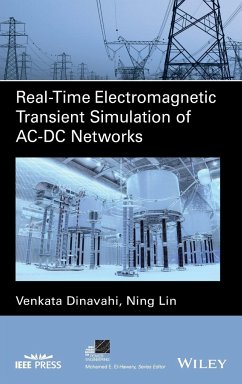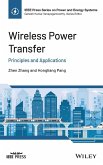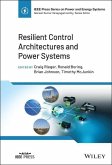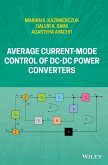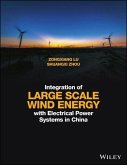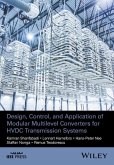Explore a comprehensive and state-of-the-art presentation of real-time electromagnetic transient simulation technology by leaders in the field
Real-Time Electromagnetic Transient Simulation of AC-DC Networks delivers a detailed exposition of field programmable gate array (FPGA) hardware based real-time electromagnetic transient (EMT) emulation for all fundamental equipment used in AC-DC power grids. The book focuses specifically on detailed device-level models for their hardware realization in a massively parallel and deeply pipelined manner as well as decomposition techniques for emulating large systems.
Each chapter contains fundamental concepts, apparatus models, solution algorithms, and hardware emulation to assist the reader in understanding the material contained within. Case studies are peppered throughout the book, ranging from small didactic test circuits to realistically sized large-scale AC-DC grids.
The book also provides introductions to FPGA and hardware-in-the-loop (HIL) emulation procedures, and large-scale networks constructed by the foundational components described in earlier chapters. With a strong focus on high-voltage direct-current power transmission grid applications, Real-Time Electromagnetic Transient Simulation of AC-DC Networks covers both system-level and device-level mathematical models. Readers will also enjoy the inclusion of:
_ A thorough introduction to field programmable gate array technology, including the evolution of FPGAs, technology trends, hardware architectures, and programming tools
_ An exploration of classical power system components, e.g., linear and nonlinear passive power system components, transmission lines, power transformers, rotating machines, and protective relays
_ A comprehensive discussion of power semiconductor switches and converters, i.e., AC-DC and DC-DC converters, and specific power electronic apparatus such as DC circuit breakers
_ An examination of decomposition techniques used at the equipment-level as well as the large-scale system-level for real-time EMT emulation of AC-DC networks
_ Chapters that are supported by simulation results from well-defined test cases and the corresponding system parameters are provided in the Appendix
Perfect for graduate students and professional engineers studying or working in electrical power engineering, Real-Time Electromagnetic Transient Simulation of AC-DC Networks will also earn a place in the libraries of simulation specialists, senior modeling and simulation engineers, planning and design engineers, and system studies engineers.
Real-Time Electromagnetic Transient Simulation of AC-DC Networks delivers a detailed exposition of field programmable gate array (FPGA) hardware based real-time electromagnetic transient (EMT) emulation for all fundamental equipment used in AC-DC power grids. The book focuses specifically on detailed device-level models for their hardware realization in a massively parallel and deeply pipelined manner as well as decomposition techniques for emulating large systems.
Each chapter contains fundamental concepts, apparatus models, solution algorithms, and hardware emulation to assist the reader in understanding the material contained within. Case studies are peppered throughout the book, ranging from small didactic test circuits to realistically sized large-scale AC-DC grids.
The book also provides introductions to FPGA and hardware-in-the-loop (HIL) emulation procedures, and large-scale networks constructed by the foundational components described in earlier chapters. With a strong focus on high-voltage direct-current power transmission grid applications, Real-Time Electromagnetic Transient Simulation of AC-DC Networks covers both system-level and device-level mathematical models. Readers will also enjoy the inclusion of:
_ A thorough introduction to field programmable gate array technology, including the evolution of FPGAs, technology trends, hardware architectures, and programming tools
_ An exploration of classical power system components, e.g., linear and nonlinear passive power system components, transmission lines, power transformers, rotating machines, and protective relays
_ A comprehensive discussion of power semiconductor switches and converters, i.e., AC-DC and DC-DC converters, and specific power electronic apparatus such as DC circuit breakers
_ An examination of decomposition techniques used at the equipment-level as well as the large-scale system-level for real-time EMT emulation of AC-DC networks
_ Chapters that are supported by simulation results from well-defined test cases and the corresponding system parameters are provided in the Appendix
Perfect for graduate students and professional engineers studying or working in electrical power engineering, Real-Time Electromagnetic Transient Simulation of AC-DC Networks will also earn a place in the libraries of simulation specialists, senior modeling and simulation engineers, planning and design engineers, and system studies engineers.

